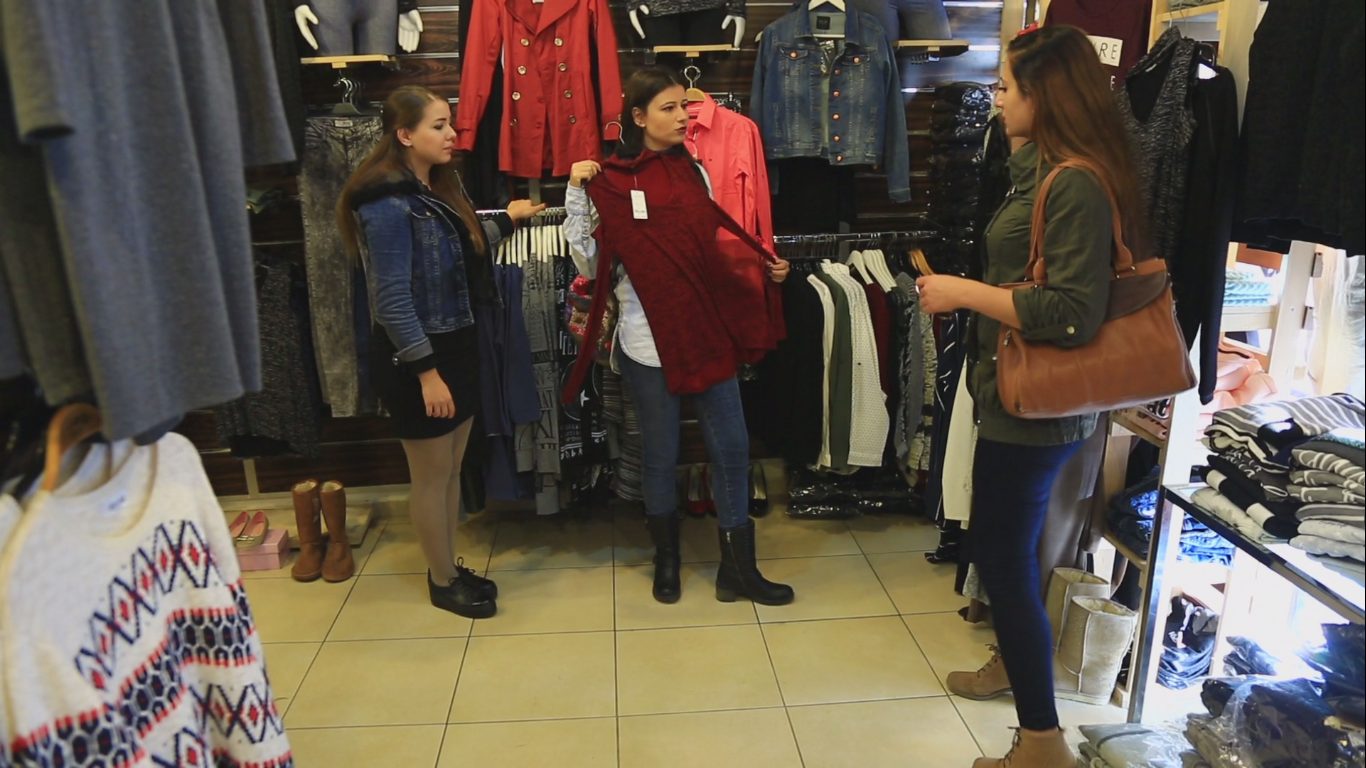In videos 10 and 11, we talked about past tense constructions, shopping dialogues as well as common expressions and behaviors.
In this section titled “Gezi Nasıldı?” (How was the trip?), you will see that the actors are talking about a past event. In this question-and-answer dialogue, we tried to emphasize the sentences in which past tense constructions were used.
You may have noticed that the past tense suffix of -(DI) in Turkish is used similarly in both verbs (gezdik, dolaştık, eğlendik etc.) and nominal words (iyiydi, güzeldi, yorucuydu, muhteşemdi etc.).
In the section titled “Neler Aldın?” (What did you buy?), we tried to highlight the language used during shopping and bargaining in traditional and modern stores in Turkey.

“Biz sadece bakıyoruz.” (We’re just looking.)
At the beginning of the video, actors are entering into a store for shopping. The salesperson then asks them “Nasıl yardımcı olabilirim?” (How can I help you?), and they answer as “Biz sadece bakıyoruz,” (We’re just looking). This expression is mostly used when shoppers are not sure what to buy or really just looking at the products, and therefore need no assistance from the salesperson. While some people constantly ask for help while shopping, some really dislike being followed by the salesperson. When you don’t need any assistance in a store
, you can easily use this phrase. Apart from this; some of the commonly used expressions while shopping are:
“Kaç beden giyiyorsunuz?” (What size do you wear?)
“Başka rengi var mı?” (Is there any other color?)
“Deneyebilir miyim?” (Can I try it on?)
“Bu üründe indirim var mı?” (Is there any discount on this product?)
“ Çok yakıştı.” (Looks very good on you.)

Shopping in a Traditional Bazaar
In Turkey, most of the cities have unique traditional bazaars. These are mainly historical bazaars located in downtowns and preserved their distinctive fabrics from past to present. Even though the most recognized bazaars are “Kapalı Çarşı” (Grand Bazaar) and “Mısır Çarşısı” (Spice Bazaar) in Istanbul, many other cities in Turkey have similar bazaars. Kemeraltı Çarşısı (Izmir), “Aynalı Çarşı” (Çanakkale), Zincirli Bedesten (Gaziantep), Uzun Çarşı (Hatay), and Tarihi Bedesten Çarşısı (Konya) are among some of them.
These relatively large and authentic bazaars are also among the most popular tourist attractions of their cities.
In these bazaars are local stores where a variety of products are sold. In these stores, you can find a number of goods that could be difficult to find in modern stores for more affordable prices. While these bazaars are rich in hand made products, they also house a number of local and traditional tastes. In these historical restaurants and street food vendors located in the bazaars, you can enjoy a variety of different flavors.
In this video, you can see that the actors leaving the store are going to the oldest and most traditional bazaar of Izmir – Kemeraltı for buying a necklace, and bargaining with the store owner.
Hiç indirim yapmıyor musunuz? (Don’t you make any discount?)
Bargaining is a very common habit in Turkey; but it’s not appropriate to bargain everywhere at each store in every case. In the video, you see that there was no bargaining for clothes shopping, but there is while necklace shopping. In Turkey, as in many other countries, it is not quite possible to bargain at large chain stores or brand stores. In these types of stores, no discount can be achieved with bargaining except for fixed discounts indicated.

Where and how can you bargain?
Usually, it’s possible to bargain at traditional bazaars and local stores. In this kind of shopping, after the seller tells the price of the product, you can start with questions like “Hiç indirim yapmıyor musunuz?” (Are you not making any discount?) as can be seen in the video. If the seller lowers the price, you can try to find out the final price by asking “Son fiyat ne olur?” (What is your last price?). The bargaining can continue or end depending on the seller’s and buyer’s attitudes. Some sellers are not very fond of bargaining and do not prolong the process, but some may offer more discounts as long as the customers ask. Especially in souvenir shops, bargaining is quite possible.
In this video, you can also see the use of some of the words for indicating a want or consent such as “olur” (all right) and “olsun” (sure). In Turkish, it’s quiet common to use “olur” instead of “evet” (yes) and “olmaz” (nope) instead of “hayır” (no).
İyi günlerde kullanın! (Hope you enjoy it)
At the end of this type of shopping, seller usually says “İyi günlerde kullanın” (Use it in good days/hope you enjoy it) or “Güle güle kullanın” (Enjoy it/Use it with smiles) to the customer, and the customer says “Kolay gelsin” (May it be easy) or “hayırlı işler” (have a good working day) to the seller. In large sales such as car or automobile, “Hayırlı olsun” is more commonly used.
Ayşin Önder
All rights reserved.
This text or any portion thereof may not be copied without prior written consent.



Leave A Comment